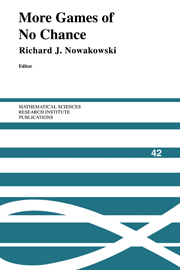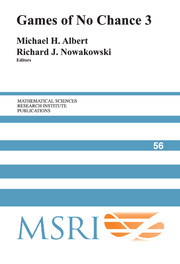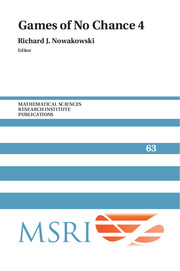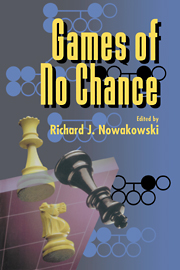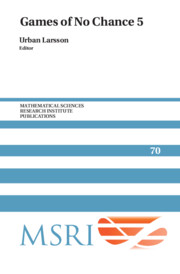More Games of No Chance
This 2003 book provides an analysis of combinatorial games - games not involving chance or hidden information. It contains a fascinating collection of articles by some well-known names in the field, such as Elwyn Berlekamp and John Conway, plus other researchers in mathematics and computer science, together with some top game players. The articles run the gamut from theoretical approaches (infinite games, generalizations of game values, 2-player cellular automata, Alpha-Beta pruning under partial orders) to other games (Amazons, Chomp, Dot-and-Boxes, Go, Chess, Hex). Many of these advances reflect the interplay of the computer science and the mathematics. The book ends with a bibliography by A. Fraenkel and a list of combinatorial game theory problems by R. K. Guy. Like its predecessor, Games of No Chance, this should be on the shelf of all serious combinatorial games enthusiasts.
- Presents results on hot games such as chess, Go, Hex, Amazons, and Chomp
- Articles from top names in computer science and mathematics, such as Berlekamp, Conway, and Guy
- Contains an annotated list of unsolved problems and a comprehensive bibliography
Product details
February 2011Paperback
9780521155632
548 pages
234 × 156 × 28 mm
0.76kg
Available
Table of Contents
- Part I. The Big Picture:
- 1. Idempotents among partisan games Elwyn Berlekamp
- 2. On the lattice Structure of finite games Dan Calistrate, Marc Paulhus and David Wolfe
- 3. More infinite games John H. Conway
- 4. Alpha-Beta pruning under partial orders Matthew L. Ginsberg
- 5. The abstract structure of the group of games David Moews
- Part II. The Old Classics:
- 6. Higher numbers in pawn endgames on large chessboards Noam D. Elkies
- 7. Restoring fairness to Dukego Greg Martin
- 8. Go thermography: the 4/21/98 Jiang-Rui endgame Bill Spight
- 9. An application of mathematical game theory to go endgames: some width-two-entrance rooms with and without Kos Takenobu Takizawa
- 10. Go endgames are PSPACE-hard David Wolfe
- 11. Global threats in combinatorial games: a computation model with applications to chess endgames Fabian Mäser
- 12. The games of hex: the hierarchical approach Vadim V. Anshelevich
- 13. Hypercube tic-tac-toe Solomon W. Golomb and Alfred W. Hales
- 14. Transfinite chomp Scott Huddleston and Jerry Shurman
- 15. A memory efficient retrograde algorithm and its application to Chinese chess endgames Ren Wu and Donald F. Beal
- Part III. The New Classics:
- 16: The 4G4G4G4G4 problems and solutions Elwyn Berlekamp
- 17. Experiments in computer amazons Martin Müller and Theodore Tegos
- 18. Exhaustive search in amazons Raymond Georg Snatzke
- 19. Two-player games on cellular automata Aviezri S. Fraenkel
- 20. Who wins domineering on rectangular boards? Michael Lachmann, Christopher Moore and Ivan Rapaport
- 21. Forcing your opponent to stay in control of a loony dot-and-boxes endgame Elwyn Berlekamp and Katherine Scott
- 22. 1 x n Konane: a summary of results Alice Chan and Alice Tsai
- 23. 1-dimensional peg solitaire, and duotaire Christopher Moore and David Eppstein
- 24. Phutball endgames are hard Erik D. Demaine, Martin L. Demaine and David Eppstein
- 25. One-dimensional phutball J. P. Grossman and Richard J. Nowakowski
- 26. A symmetric strategy in graph avoidance games Frank Harary, Wolfgang Slany and Oleg Verbitsky
- 27. A simple FSM-based proof of the additive periodicity of the Sprague-Grundy function of Wythoff's games Howard Landman
- Part IV. Puzzles and Life:
- 28. The complexity of clickomania Therese C. Biedl, Erik D. Demaine, Martin L. Demaine, Rudolf Fleischer, Lars Jacobsen and Ian Munro
- 29. Coin-moving puzzles Erik D. Demaine, Martin L. Demaine and Helena A. Verrill
- 30. Searching for spaceships David Eppstein
- Part V: Surveys:
- 31. Unsolved puzzles in combinatorial game theory: updated Richard K. Guy and Richard J. Nowakowski
- Bibliography of combinatorial games: updated Aviezri S. Fraenkel.

